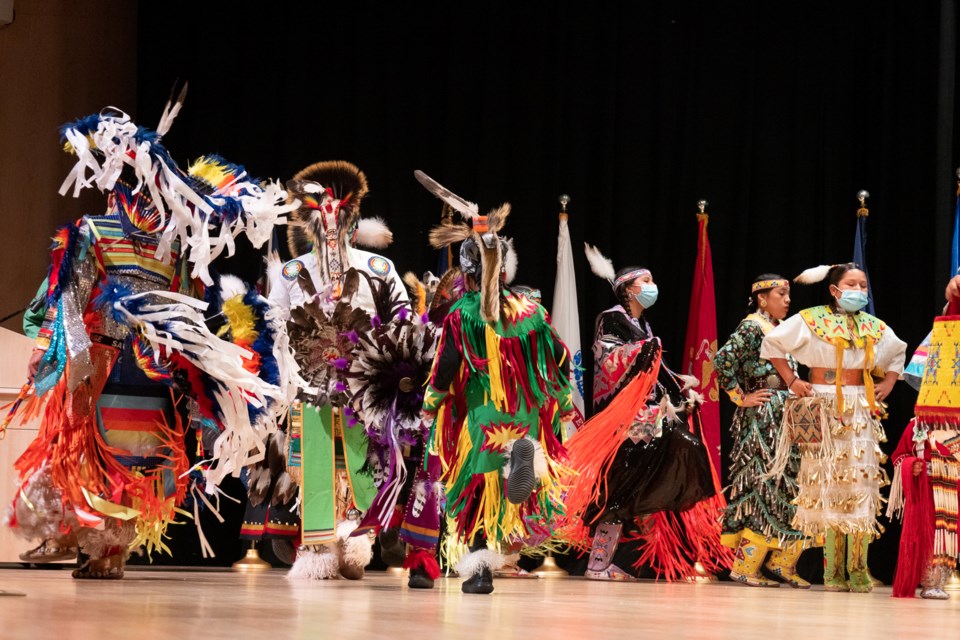The Longmont Sister Cities Association is being recognized for its formation of the first ever sister cities relationship between a sovereign tribal nation and a U.S. city.
Sister Cities International, a nonprofit member association for United States sister city organizations, awarded their 2022 Innovation Award in Arts and Culture to Longmont in recognition of the signing ceremony that took place last September.
“We are honored and humbled to be recognized by Sister Cities International,” Longmont Sister Cities President Janice Rebhan said. “It’s the culmination of four years of intense work from LSCA board members and led by former Longmont Mayor Brian Bagley.”
In 2018, a delegation led by Bagley traveled from Longmont to the Wind River Reservation in Wyoming to visit with the Northern Arapaho Business Council. The following year, a delegation of Northern Arapaho youth visited for a four-day exchange in Longmont.
It was the first time these students were welcomed into non-native homes and friendships were born. The exchange focused on building trust, sharing culture and having fun.
The success of this first visit led to the plan to create the first ever City-Tribal sovereign nation relationship in the U.S.
“This agreement represents a momentous opportunity for the Northern Arapaho people,” Northern Arapaho Business Council Co-Chairman Lee Spoonhunter said before the historic signing. “These kinds of relationships help promote a culture of understanding, inclusivity and mutual respect that benefits Tribal and non-Tribal communities alike. The Northern Arapaho Tribe is proud to be sister cities with Longmont, a relationship that we’re optimistic will lead to productive cultural exchange and economic growth for years to come.”
COVID delayed the official signing ceremony, which was ultimately held on Sept. 18, 2021 at the Longmont Museum. The ceremony included over 60 Northern Arapaho tribal members, representatives of several tribal ceremonial groups and elders.
The relationship is meant to create opportunities for Longmont residents to learn about the former residents of the Colorado Front Range, and for the Arapaho to be able to visit their homelands in a welcoming community.
For tribal leaders, there is hope the two organizations can create an opportunity for Arapaho youth to visit a safe and welcoming city and expose isolated youth to educational opportunities that don’t exist locally.
The September celebration included an honor guard, Arapaho Drum Group and native dancers from the reservation, while Longmont groups included the American Legion Color Guard, Longmont High School Drum Line and a breakdancing group.
“We are proud of this accomplishment and hope other communities reach out to other Native American Sovereign Nations to foster better understanding and jointly build a path to a better future,” Rebhan said.
While Longmont’s agreement with the Northern Arapaho is the first-ever with a sovereign Tribal nation, the city is no stranger to these kinds of alliances. Longmont is also sister cities with Chino, Japan, for 32 years and Ciudad Guzman, Mexico, for 25 years.
This summer, students from Longmont traveled to the Wind River Reservation to learn about the Arapaho culture and experience traditional foods, ceremonies and crafts. Students from the Wind River Reservation traveled to Longmont to learn about the Arapaho traditional homeless, visit Denver, travel to Estes Park with an elder to hear stories about the significance of this area for the Arapaho and create friendships with local families.
“As the Longmont students visit the reservation for the first time and new Arapaho students travel to Longmont, we look forward to creating opportunities for more in the community to experience the benefits of mutual cooperation,” Rebhan said. “There is much to be learned from each other and we look forward to creating a deep and lasting relationship based on trust and respect.”



